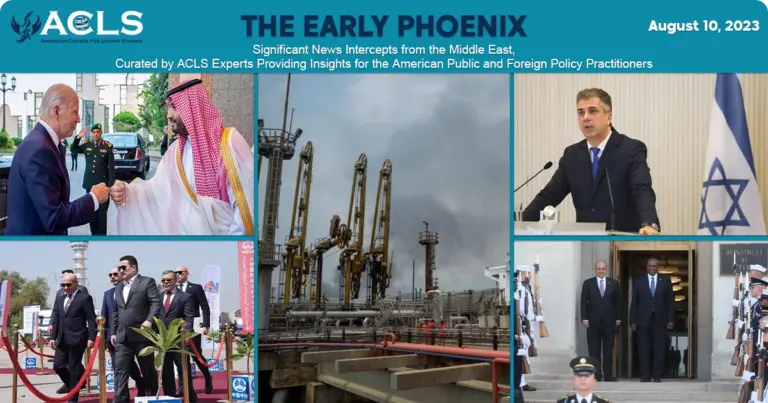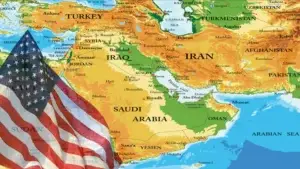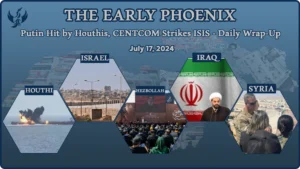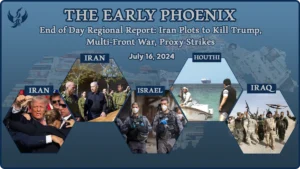Listen to this article
TOP HEADLINES:
- American Newspaper Says Saudi-Israeli Normalization Deal is Possible Within a Year
- Israel FM Cohen Calls for US-Saudi Nuclear Defense Agreement in Normalization Deal
- Iran Says Daily Oil Output to Hit 3.5M Barrels in September
- Washington and Baghdad Renew their Commitment to Military Security Cooperation
- Iraqi PM Sudani Announces He Won’t Run in Upcoming Elections
Turkiye
- Türkiye and UK Unveil Deal to Tackle Surge in Illegal Migration (Reuters). Türkiye and the United Kingdom have announced a joint deal to combat illegal migration and dismantle people-smuggling gangs. The partnership involves the establishment of a new operational center by the Turkish National Police, focused on enhancing intelligence alignment and collaboration between the two nations. The deal also facilitates the exchange of customs data and intelligence, aiming to disrupt the supply chain of materials used in illegal migration. The agreement is part of the UK’s “Stop the Boats” week and reflects efforts to address the issue of illegal migrants arriving in Britain. The collaboration will be highlighted at the U.K.-Türkiye Migration Dialogue meeting in autumn.
- Greece Pushes Back Migrants, Türkiye Rescues 30 People in Aegean Sea (TRT World). The Turkish Coast Guard rescued 30 irregular migrants in the Aegean Sea who had been pushed back into Turkish waters by Greek authorities. The migrants were found in a rubber boat off the coast of Dikili district in Izmir province. Türkiye and international human rights organizations have criticized Greece’s pushing back migrants, stating that it endangers vulnerable individuals and violates humanitarian and international laws.
- Türkiye Seizes ISIS’s Global ‘Lone Wolf’ Database (Daily Sabah). Turkish police conducted a successful operation in Istanbul, resulting in the seizure of a valuable database containing information about 9,952 “lone wolf” terrorists from the ISIS terrorist group. The process began with individuals linked to Iranian intelligence discussing the sale of the database stolen from ISIS leadership. The Iranian Ministry of Intelligence was negotiating the purchase of the database for 8.5 million euros ($9.33 million). The database contains biographical details of lone-wolf terrorists from various countries, including the U.S., Canada, the U.K., France, and Germany.
- Greek FM Hails Improved Relations with Türkiye (Hurriyet Daily News). Greek Foreign Minister Yorgo Yerapetritis has praised the improving relationship between Greece and Türkiye, attributing diplomatic progress to his rapport with Turkish counterpart Hakan Fidan. Yerapetritis emphasized cultivating peaceful Turkish-Greek relations, particularly in the Aegean and Eastern Mediterranean. They highlighted upcoming meetings between Greek Prime Minister Kyriakos Mitsotakis and Turkish President Recep Tayyip Erdoğan. Despite ongoing disputes over territorial waters and island sovereignty, Yerapetritis suggested that arbitration might be considered through international courts.
- Erdogan Says Achieving Stability in Syria will Accelerate the Return of Refugees, and Turkiye is Ready for Dialogue (Al Sharq Al Awsat). Turkish President Recep Tayyip Erdogan said that Turkey prevented the establishment of a “terrorist mini-state” on its southern border through the operations carried out by its forces in northern Syria, noting that achieving stability in Syria would contribute to accelerating the return of refugees to their country…”Through our operations in the north of Syria, we have prevented the formation of a terrorist mini-state at our southern borders. We continue to strike terrorist organizations in the north of Syria and Iraq, which threaten the territorial integrity of the two neighboring countries,” Erdogan added during a speech before the 14th meeting of Turkish ambassadors to the foreign ministry, which is currently being held in Ankara.
ISRAEL AND PALESTINIAN TERRITORIES
- U.S. Reiterates Netanyahu is Not Invited to the White House, but Will Meet Biden ‘Somewhere in the US’ (Times of Israel). The White House has reaffirmed that Israeli Prime Minister Benjamin Netanyahu was not invited to meet US President Joe Biden at the White House. White House National Security Council spokesperson John Kirby stated that a meeting between the two leaders is anticipated in the United States in the fall without specifying a location. This comes after Netanyahu’s office initially claimed that Biden invited him to a meeting in the US, and Netanyahu himself reiterated this claim in recent interviews with US media. The discrepancy highlights differing accounts of the communication between the two leaders.
- Israel FM Cohen Calls for US-Saudi Nuclear Defense Agreement in Normalization Deal (Jerusalem Post). Israel’s Foreign Minister Eli Cohen has proposed that the United States include a guarantee to defend Saudi Arabia against Iranian nuclear aggression as part of a potential normalization deal between Israel and Saudi Arabia. Cohen’s suggestion addresses Saudi Arabia’s concerns about Iran’s nuclear program and the potential for a regional nuclear arms race. He compares the situation to the US defense commitment that acts as a deterrent for South Korea against North Korean aggression. The Israeli National Security Council has been evaluating the impact of various possibilities on Israel’s security, focusing on advancing its ties with Saudi Arabia. However, Israel’s stance remains centered on preventing Iran from obtaining a nuclear weapon. The US-Saudi defense agreement is expected to align with Israel’s security interests and may face challenges in the Senate if viewed as a security problem. The Biden administration aims to complete the deal by the end of 2023. Saudi normalization talks also involve concessions from Israel toward the Palestinians.
- Israeli Vessel Breaks Through Moscow’s Black Sea Grain Blockade (Jerusalem Post). An Israeli merchant ship, the Ams1, has reportedly defied Russia’s blockade of the Black Sea by entering the Ukrainian branch of the Danube, becoming the first vessel to openly challenge the blockade since Russia pulled out of an agreement with Ukraine allowing grain exports from its ports. The ship departed from the Port of Ashdod and was accompanied by the American aircraft P8 Poseidon for security. Four more vessels followed Ams1 into the Danube. Russia withdrew from the UN-brokered Black Sea grain deal due to unmet demands and concerns about Ukrainian grain distribution. The blockade has caused global wheat and corn futures to rise.
- UAE’s Foreign Minister Met with Israel’s Opposition Leader Yair Lapid for Three Hours in Italy (Haaretz). UAE’s Foreign Minister Abdullah bin Zayed Al Nahyan held a three-hour meeting with former Israeli Prime Minister and current opposition leader Yair Lapid in Italy. They discussed strategic collaborations, Gulf country relations, and cooperation projects to deepen common interests. This meeting is significant as it comes amid a lack of contact between UAE officials and the current Israeli Prime Minister, Benjamin Netanyahu, who has not met with UAE representatives since returning to office in December. Netanyahu’s coalition’s hard-line views have reportedly strained relations with the UAE following the normalization of ties through the Abraham Accords in 2020.
Egypt & North Africa
- 10 Officers of the Sudanese Security and Intelligence Service killed in Omdurman (Al-Ghad). An al-Ghad correspondent from Khartoum reported that 10 Sudanese security and intelligence officers were killed in the Omdurman clashes. Our correspondent added that the conflicts between the Sudanese army and the Rapid Support Forces lasted 10 hours yesterday in Omdurman. However, there is a state of pressure from which hospitals suffer due to the large number of injuries and victims due to the clashes.
GULF REGION & YEMEN
- American Newspaper Says Normalization of Saudi-Israeli Relations is Possible Within a Year (Al Nahar). The Wall Street Journal quoted US officials as saying that it is possible to reach an agreement to normalize relations between Saudi Arabia and Israel under the auspices of the United States within a year at most…The American newspaper indicated that an agreement was reached between Washington and Riyadh on the broad lines of the deal, but essential issues still take time to resolve…She added that Saudi Arabia would demand “significant concessions” from Israel on the Palestinian issue without giving details about it…And she said that the United States would guarantee Saudi Arabia steps toward the Palestinians in return for Saudi Arabia obtaining American aid in the civil nuclear field, which Israel opposes.
- More Than 1.3 Million Amphetamine Tablets Seized in Riyadh (Al Ekhbariya). The Anti-Narcotics Department seized more than 1,300,000 tablets of the narcotic amphetamine hidden in a shipment of electric machines inside a warehouse…Its promoters, residents of both Jordanian and Syrian nationalities, were also arrested, suspended, and preliminary legal measures were taken against them and referred to the Public Prosecution.
- Saudi-American Alliance to Establish an Infrastructure for Drones in the Kingdom (Press Bee). At a time when Saudi Arabia is moving towards launching significant partnerships in the field of drones, the Saudi Technology Excellence Holding Company and Aerobotics Ltd., a subsidiary of the American Ondas Group – a leading provider of private industrial wireless networks, commercial drones, and automated data solutions – announced a strategic alliance to create a local drone infrastructure throughout the Kingdom…The Saudi and American companies plan to establish an office inside the Kingdom to localize unmanned aerial systems and solutions and provide air data solutions to local government and commercial entities, according to a joint statement.
- Saudi Embassy Officially Starts Activities in Tehran (Shorouk News). The official Iranian news agency IRNA, quoting an unnamed informed source, revealed that the Saudi embassy in the capital, Tehran, has started its work months after the two countries announced the resumption of relations under Chinese mediation…Today, Wednesday, the source confirmed that the Saudi embassy in Tehran officially started its work three days ago without giving further details…The Iranian Foreign Ministry spokesman, Nasser Kanaani, spoke at a press conference last Monday about a “positive trend” regarding his country’s relationship with Saudi Arabia.
- Yemen…Warnings of the Consequences of the Houthis’ Economic War (24. a). Yemeni Foreign Minister Ahmed bin Mubarak warned today, Wednesday, of the consequences of the Houthis’ economic war on the humanitarian situation in the country. This came during his meeting with the Special Envoy of the Secretary-General of the United Nations to Yemen, Hans Grundberg, in the Saudi capital, Riyadh, to discuss developments in the Yemeni arena and efforts to achieve peace, according to the official news agency, Saba…Bin Mubarak warned of “the consequences of the Houthi militia’s economic war on the deteriorating humanitarian situation, and the need to take a firm international stance against these practices.”
- Amnesty International Calls on Houthis to Reveal Fate of Baha’i Detainees (Yemen Monitor). Amnesty International called on the Houthi armed group to immediately and unconditionally release all detainees of the Baha’i community. In the petition launched under the title “11 forcibly disappeared Baha’is are in great danger,” Amnesty said that on May 25, Houthi armed forces stormed a peaceful gathering of Baha’is in Sana’a and arrested and forcibly disappeared 17 people, including five women. After international pressure, six people – a man and three women – were released in June and two men in July. It called on all human rights activists and organizations to issue statements and letters to the Houthi group urging it to quickly reveal the fate and whereabouts of the eleven Baha’i detainees held by them and to release them immediately and unconditionally.
IRAN
- Iran Says Daily Oil Output to Hit 3.5M Barrels in September (Al Monitor). Iran’s National Iranian Oil Company (NIOC) CEO, Mohsen Khojastehmehr, has announced that the country’s oil output will reach 3.5 million barrels per day (bpd) by September 22. This increase from the current 2.2 million bpd is expected to come from both onshore and offshore fields, with an additional 150,000 bpd added within the next two weeks. On the other hand, Saudi Arabia has extended its 1 million bpd oil cut into August and may deepen it further for stability in oil markets.
- Iran Says it Has Technology to Build Supersonic Cruise Missile (Reuters). Iran has announced that it possesses the technology to build a supersonic cruise missile, a development that could raise concerns about Tehran’s missile capabilities in Western countries. The rocket is said to be undergoing tests and is expected to be difficult to intercept due to its supersonic speeds. Iran has a significant missile program and claims that its missiles can reach the bases of its adversaries, including Israel and the United States. Western analysts have noted that the country sometimes exaggerates its missile capabilities despite Iran’s assertions. This announcement comes amid heightened tensions in the region, with recent reports of U.S. warships arriving in the Red Sea to deter potential actions by Iran.
- Iran to Host Conference on Ties with BRICS (Tasnim News Agency). Iran is set to host a conference focusing on the collaboration between Iran and BRICS nations, according to Iranian Foreign Ministry Spokesperson Nasser Kanaani. The “Iran and BRICS, prospect for Cooperation” meeting is scheduled in Tehran. Senior BRICS officials, including Russia’s deputy foreign minister, will participate in one of the panels. Kanaani highlighted the significance of Iran’s diplomatic ties with Russia and the potential for bilateral dialogue, particularly in light of Russia’s role in the JCPOA and its revival negotiations.
- Islamabad Temporarily Halts Iran-Pakistan Gas Pipeline (Iran International). Pakistan has temporarily halted the Iran-Pakistan gas pipeline project, initially a joint endeavor between India, Pakistan, and Iran, which later evolved into a bilateral initiative between Pakistan and Iran. The decision is reportedly influenced by pressure from the United States due to its sanctions against Iran over nuclear concerns. Pakistan issued Iran a ‘Force Majeure and Excusing Event’ notice, suspending its obligations under the project until US sanctions are lifted or Washington permits the project’s resumption. While Iran continues its pipeline segment, Pakistan’s section has faced delays and setbacks due to international sanctions.
SYRIA
- Syria’s Assad Refuses to Meet Erdoğan ‘On His Terms’ (Daily Sabah). Syrian regime leader Bashar Assad has refused to meet President Recep Tayyip Erdoğan on the latter’s terms, emphasizing his reluctance to address Ankara’s security concerns regarding terrorist groups near Türkiye’s borders. Despite recent attempts at rapprochement between Ankara and Damascus, tensions persist due to Türkiye’s support for opposition to Assad and its military involvement in northern Syria. While Türkiye has expressed openness to normalizing ties, Assad insists on Türkiye’s withdrawal from northern Syria, a condition Türkiye rejects due to its counterterrorism efforts in the region. This ongoing disagreement highlights the challenges in comprehensively normalizing the two countries.
- US Vows to Keep Assad’s Chemical Weapons Program in UN Spotlight Despite Russian, Chinese Opposition (New Arab). On Tuesday, the United States and its allies vowed to keep the Syrian regime’s failure to account for its chemical weapons program in the spotlight at the UN Security Council every month despite opposition from Russia and China…US Ambassador Linda Thomas-Greenfield told the council Syrian regime President Bashar Assad’s government “has repeatedly lied to the international community” and to investigators from the international chemical weapons watchdog, which has confirmed that it used these banned weapons on at least nine occasions.
- Assad Claims Damascus Has Found Many Ways to Bypass the Caesar Act (Sky News Arabia). Sky News Arabia conducted an exclusive interview with Syrian President Bashar al-Assad at the Muhajireen Palace in Damascus, during which he discussed many issues and the latest developments…During the dialogue, Al-Assad talked about many topics, such as the spread of the Captagon trade, the relationship with Turkey and Hamas, and the position towards the United States.
IRAQ
- Washington and Baghdad Renew their Commitment to Military Security Cooperation (Aljazeera). The United States and Iraq renewed their commitment to strengthening security and military cooperation and protecting regional stability today, Wednesday, after the joint security cooperation dialogue between them, which was held in Washington, DC…A joint statement stated that the conference reflects the bilateral strategic partnership and builds on the foundation laid by previous bilateral discussions.
- Iraqi PM Sudani Announces He Will Not Run in Upcoming Elections (Elaph). Al-Sudani announced on Wednesday that he would not run in the upcoming Iraqi elections. The final number of political alliances that will compete in the elections has been reported, including those representing militias…296 parties have been registered, and 63 are pending. Today, the “Euphrates” movement, headed by Prime Minister Muhammad Shia’a al-Sudani, announced that it would not participate in the local government elections for the governorates scheduled for December 18.
LEBANON
- Iran is Moving Hezbollah on the Border.. and Israel is Watching (24). The Israeli newspaper “Maariv” reported that Iran is pushing Lebanese Hezbollah to move on the northern front and that the organization has allowed itself “more,” which could cause damage to Israel, which is closely monitoring the show. The newspaper dealt with the Israeli Minister of Defense, Yoav Gallant, visiting the Jabal al-Rous area on the Lebanese border.
- Hezbollah leaders Meet at Syrian-Lebanese border to Discuss Confronting an “American Attack” (Al Sharq Al Awsat). Sources of the Syrian Observatory for Human Rights reported that the Lebanese Hezbollah militia held a new meeting at the level of leaders during the past hours in the Tafil area located on the Syrian-Lebanese border in Damascus countryside after a prominent leader of the party returned from a quick inspection tour of Deir Ezzor and held meetings with the Hizballah leaders there…According to SOHR sources, the last discussion centered on a mechanism for confronting any possible US attack on the militias in Deir Ezzor and setting up a plan to target the coalition bases east of the Euphrates in case the latter decided to escalate against the militias affiliated with Iran.




